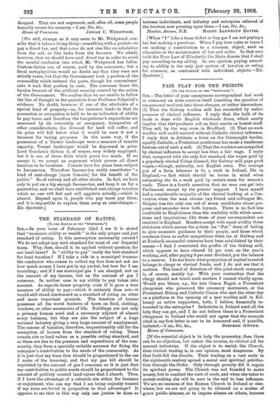THE STANDARD OF RATING.
[To TIEN EDITOR OF MR "srxerma.-] Sne,—In your issue of February 22nd I see it is stated that "economic ability or wealth" is the only proper and just standard of rating. Is this assumption necessarily correct? We do not adopt any such standard for most of our Imperial taxes. Why, then, should it be applied without question for our local taxes ? Is "ability to pay" really the beat standard for local taxation? If I take a ride in a municipal tramcar the conductor who comes to collect my fare does not ask me how much money I have got in my pocket, but how far I am travelling; and if I use municipal gas I am charged, not on the amount of my income, but on the amount of gas I consume. In neither case is my ability to pay taken into account. As regards house property, even if it gave a true measure of ability to pay—which it certainly does not—it would still stand condemned as a standard of rating on other and more important grounds. The taxation of houses possesses all the worst features of taxes on food, clothing, windows, or other necessaries of life. Buildings are not only a primary human need and a necessary adjunct of almost every business, but they are also the subject of a huge national industry giving a very large amount of employment. The canons of taxation, therefore, unquestionably call for the exemption of houses from the standard of rating. There remain site or land values as a possible rating standard, and as these are due to the presence and expenditure of the com- munity, they form a specially suitable measure for fixing the ratepayer's contribution to the needs of the community. As it is just that my tram fare should be proportioned to the use I make of the tramway, and that my gas bill should be regulated by the amount of gas I consume, so it is just that my contribution to public needs should be proportioned to the amount of publicly created land-values that I absorb. Thus, if I have the advantage of a valuable site either for business or enjoyment, who can say that I am being unjustly treated if my rates are levied in proportion to that advantage? It appears to me that in this way only can justice be done as
between individuals, and industry and enterprise relieved -of the burdens now pressing upon them.—I am, Sir, &c.,
Newbie, Annan, N.B. HARRY LLEWELYN DAVIES.
[When "I" take a tram ticket or buy gas I am not paying a tax but making a purchase. When I pay true rates or taxes I am making a contribution to a common object, such as education or the maintenance of law and order. In that case (vide the Poor Law of Elizabeth) the State directs that I shall pay according to my ability. In our opinion, paying accord- ing to ability is the only just system of taxation or rating for common, as contrasted with individual, objects.—ED. Spectator.]










































 Previous page
Previous page